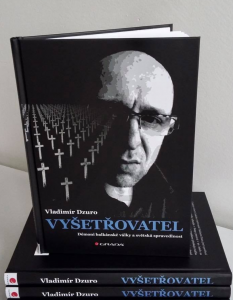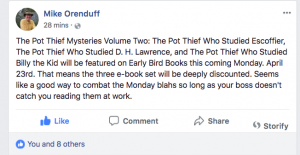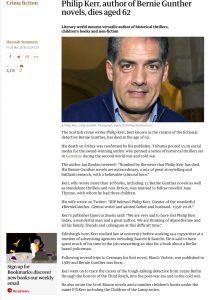Sold: “SHATTERED MINDS: How the Pentagon Fails Our Troops with Faulty Helmets” by Robert Bauman and Dina Rasor
/1 Comment/in Book Biz, Philip Turner Book Productions, Philip Turner's Books & Writing /by Philip TurnerI first blogged about SHATTERED MINDS: How the Pentagon Fails Our Troops with Faulty Helmets in 2016, linking it to a Washington Post story by Ben Guarino about an amazingly hard material found in nature:
Authors Robert Bauman and Dina Rasor were still working on their manuscript in 2016, and I was preparing to begin submitting the project to publishers. There’s an unusual backstory to the book, which I’ll outline below.
In 2008, when I was acquiring books as Editorial Director at Union Square Press, I read a stunning NY Times story about two whistleblowers at a defense contractor in North Dakota who at great personal risk revealed that their employer was knowingly shorting the amount of the protective material Kevlar in the combat helmets they were fabricating for the Pentagon, to increase their profits at the expense of troop safety. At the suggestion of Paul Rieckhoff, founder of Iraq and Afghanistan Veterans of America. I commissioned a book on this grotesque boondoggle to be written by two ace reporters on military procurement and the Pentagon, Dina Rasor and Robert Bauman. In 2009, while they were working on the manuscript, and discovering yet another brave whistleblower to include in the narrative, I left that job and parent company Sterling Publishing canceled the contract, handing the rights back to the authors. Fast forward several years and Bob and Dina approached me to see if in my new role as an agent I would be game to try to help them re-sell the book to a new publisher, which I agreed to, with generous approval from their original agent Bonnie Nadell. This is exactly the type of “imperative nonfiction” I have long cultivated as a publishing professional, and I was very excited to accept the challenge of reselling it to a new publisher. This was part of my pitch letter to publishers:
This revelatory book, written by two authors who’ve covered the Pentagon for many years, reports that in the twenty-first century, while traumatic brain injury (TBI) has become the signature injury suffered by our troops, the defense establishment has failed US fighting men and women by continuing to issue them an antiquated military helmet that fails to mitigate the worst of this tragic harm, even though superior design and technology are increasingly available. This investigation by Dina Rasor and Robert Bauman, the first book to examine this most basic item of military equipment, features the stories of two sets of whistleblowers determined to expose the truth about the failures of the military helmet bureaucracy. Their book braids together the two stories of two sets of whistleblowers to chronicle the helmet scandal and its human impact.
Indeed, in 2017 I sold the book to Potomac Books, a military and public affairs imprint at the University of Nebraska Press, as documented in the deal report below posted at the book industry site publishersmarketplace[dot]com.
Potomac has scheduled the book for publication in March 2019. I’ll post a cover when they have it ready. Meantime, the authors have already received these superb endorsements:
SHATTERED MINDS will set a challenge for technologists, designers, people who use 3D printers, materials scientists, and high level defense thinkers to finally design the most protective military helmet possible. Despite the Pentagon’s failures to this point, we hope to gain their attention to bring new talent and focus to the goal of producing a superior helmet. In the same regard, we are excited about the effort being undertaken by the Head Health Challenge, which also relates to football helmets, an effort that has been covered by Liz Stinson in Wired magazine. I’m hopeful we’ll be able to forge a constructive link between the Defense Dept and the NFL, in as much as the league often cites its cooperation with the US military. I recommend you read the fascinating article by Ben Guarino, which also has video from UC Riverside scientist David Kisailus.
Sold: “The Investigator: Justice and Demons of the Balkan Wars” by Vladimir Dzuro
/1 Comment/in Book Biz, Philip Turner Book Productions, Publishing & Bookselling /by Philip Turner![]() In my work as a literary agent, I represent former Prague police detective Vladimir Dzuro, author of THE INVESTIGATOR: JUSTICE AND DEMONS OF THE BALKAN WARS, which I’ve recently sold to Potomac Books*, a division of University of Nebraska Press, for publication in Fall 2019. In the 1990s, while the wars in the former Yugoslavia were still raging, Dzuro began investigating war crimes. Thanks to publishing friend Janice Goldklang of Other Press, who introduced me to the author. His book is a view-from-the-ground narrative account of the brutal conflict fought among Serbs, Croats, and Bosnians. It combines insight from his investigations of war crimes cases while the brutal war was still unfolding, and the search for and capture of war criminals after the conflict ended. The book was first published in the Czech Republic by Grada (pictured below). Author Dzuro is now Chief of New York Headquarters Office at the United Nations Office of Internal Oversight Services.
In my work as a literary agent, I represent former Prague police detective Vladimir Dzuro, author of THE INVESTIGATOR: JUSTICE AND DEMONS OF THE BALKAN WARS, which I’ve recently sold to Potomac Books*, a division of University of Nebraska Press, for publication in Fall 2019. In the 1990s, while the wars in the former Yugoslavia were still raging, Dzuro began investigating war crimes. Thanks to publishing friend Janice Goldklang of Other Press, who introduced me to the author. His book is a view-from-the-ground narrative account of the brutal conflict fought among Serbs, Croats, and Bosnians. It combines insight from his investigations of war crimes cases while the brutal war was still unfolding, and the search for and capture of war criminals after the conflict ended. The book was first published in the Czech Republic by Grada (pictured below). Author Dzuro is now Chief of New York Headquarters Office at the United Nations Office of Internal Oversight Services.
I’ve long been horrified and grimly fascinated by the Balkan Wars, and in 1995 edited and published a remarkable book titled Sarajevo, Exodus of a City, by Bosnian playwright Dzevad Karahasan. The back cover copy explains that the author “Sketches a cultural portrait of Sarajveo, describing the city plan, its domestic architecture, even its culinary styles—all intertwined with searing descriptions of the siege, and anecdotes about how his life and those of his neighbors were ravaged by war. A Muslim, Karahasan invokes the Sarajevo that was once ‘a microcosm, a center of the world that contained the whole world within itself,’ a ‘new Jerusalem’ where people of different languages, faiths, and cultures lived together harmoniously.” For the author, Sarajevo was a shining city, a second Jerusalem, from an explicitly philosemitic viewpoint. The Village Voice Literary Supplement named it one of their best books of that year. The book’s had a long shelf life, as in 2015, an Indian travel writer named Abhijit Dutta visited postwar Sarajevo and in a beautiful essay on a website called LiveMint closely read Karahasan’s book and used it to gauge what has been lost since the Balkan Wars began in 1991.
Despite the horrors of our calamitous century, and the last one, I derive meaning and purpose from helping authors like Dzevad Karahasan and Vladimir Dzuro contribute to the historical record about the recent war that gave rise to one of the darkest phrases in our modern lexicon, “ethnic cleansing.”

*Earlier this year I sold Potomac Books Shattered Minds: How the Pentagon Fails Our Troops with Faulty Helmets by Robert Bauman and Dina Rasor, which will also be published in 2019.
A Quartet of Summer Readings at Books Are Magic
/0 Comments/in Book Biz, Canada, Honourary Canadian, Literature, Personal History, Family, Friends, Education, Travels /by Philip TurnerJust attended a really enjoyable quartet of author readings for three books-in-progress, and one that just been sold to a publisher this week, at Books Are Magic in Cobble Hill, Brooklyn. An MC informed members of the audience that the Brooklyn Writers Space, with two locations in the borough, was a sponsor of the reading series. The four participants, and evidently many other local scribes, find space to work and write there, at what we heard are “humane” rents.
I had come primarily to hear journalist Diantha Parker read from what I understood would be a memoir about her father. I’m enthralled by a lot of first person writing, so I went eager to hear some of the work. Parker read first. She set up her excerpt by explaining that in the very early days of WWII, before the US was in the war, her father, a rather proper Bostonian, had enlisted in the Canadian forces to join the fight against fascism. He fought in and survived the lethal battle of Dieppe, where he was captured and made a Canadian POW for the next three years.
She read well, with many deft strokes about his life and dark habits, a complicated man whose postwar life was shadowed by his brutal years as a captive, and the near-death march he and other Allied prisoners endured just before war’s end. Other passages showed how she’s fleshing out what this all means to her now, so many decades later. I was fascinated by the Canadian aspects of the story, and can imagine that many Canadian editors I know, and reader friends there, would likely be interested in the story. Fair to say, I will now be eager to read or hear more from her work.
The other readers were also excellent: Ryan Harty, Joanna Hershon, and Julie Orringer, all published novelists. Their work was also all very strong, and quite varied one from another. Bravo to the Brooklyn Writers Group, which is clearly helping writers produce great work. First pic here is Diantha Parker. Books Are Magic is a very nice bookstore, with a superb vibe for readings!
Digital editions of three POT THIEF books, deeply discounted April 23 at Early Bird Books
/0 Comments/in Book Biz, Philip Turner's Books & Writing /by Philip Turner
If you’ve been wanting to sample the POT THIEF mystery series—set in Albuquerque and featuring Hubie Schuze, a dealer in Native American antiquities—an April 23 promotion at the website of the digital bookseller Early Bird Books, touted on Facebook today by author J. Michael Orenduff, a client of my literary agency, is a terrific way to get started. Good news if you enjoy these novels, which have clever plots, sharp repartee among the recurring characters, and the atmosphere and culinary culture of the Southwest: there are eight books in the series. The latest, The Pot Thief Who Studied Edward Abbey, which Publishers Weekly gave a starred review, will be out in May.
Sold: “More Deadly than the Male: The First Ladies of Horror”
/0 Comments/in Book Biz, Literature, Philip Turner Book Productions /by Philip Turner
Saying Goodbye to Philip Kerr, a Favorite Novelist, and Hoping for One More Bernie Gunther Novel
/7 Comments/in Book Biz, Publishing & Bookselling, Reading /by Philip Turner March 26 Update from Publishers Lunch:
March 26 Update from Publishers Lunch:
Philip Kerr, 62, author of the Bernie Gunther crime novels and many other works of fiction for adults and children, died Friday of cancer. Putnam will publish his newest series novel, Greeks Bearing Gifts, on April 3, and Kerr had finished a draft of the next Gunther novel, Metropolis, slated for publication next year. Kerr’s longtime editor, Marian Wood, said in a statement: “Working with Philip Kerr was the kind of experience all editors hope to have. In the twenty-plus years we worked together I found him responsive, funny, brilliant, and totally committed to his writing and hence, to being edited as long as he thought the editing was serious. He was an amazing human being and I will always miss him. At the moment, there is a huge hole in my life. I suspect it will stay with me as long as he lives in my memory–which means, as long as I live.”
—-
 So deeply saddened by the sudden death at age 62 of the hugely talented novelist Philip Kerr, creator of the outstanding 11-book Bernie Gunther detective series. I’ve read Kerr’s books since the Berlin Noir Trilogy, featuring the Berlin police detective Gunther began appearing in 1989. In 2012 I wrote a blog post “Loving Philip Kerr’s Bernie Gunther Novels” where I shared this video from his website:
So deeply saddened by the sudden death at age 62 of the hugely talented novelist Philip Kerr, creator of the outstanding 11-book Bernie Gunther detective series. I’ve read Kerr’s books since the Berlin Noir Trilogy, featuring the Berlin police detective Gunther began appearing in 1989. In 2012 I wrote a blog post “Loving Philip Kerr’s Bernie Gunther Novels” where I shared this video from his website:
Another time I wrote this about a later Gunther novel, Field Gray:
“Field Gray, a Bernie Gunther novel, features the detective who’s navigated the amoral world of Berlin before, during, and after WWII in seven magnificent books. The latest has especially brilliant plotting, w/the narrative taking Gunther and his memory through all the war years as he endures harsh interrogation from Yanks who arrest him in Cuba in 1954. I find inflections of the Guantanamo and Abu Ghraib prison camps in the book. Kerr is a master. If you’ve never read a Bernie Gunther novel, I urge you to begin the series. March Violets is the first, and I do recommend you read them in order, though I supposed one could also just start with Field Gray.”
I woke this morning to find that a friend who knows how much I enjoy Kerr’s books had tagged me in a Facebook post linking to the brief obituary of Kerr from the Guardian pasted in here; I’m sure there will be many full tributes to come. Kerr wrote other books, as well, including a very good dystopian novel called The Second Angel. In an newsletter emailed to his readers last year, he wrote that there would be a new Bernie Gunther title out in spring 2018, Greeks Bearing Gifts. I see a cover for the US edition is on his website, which as of tonight does not yet mention his passing. I hope he was able to see the printed book before he died. My condolences to his family, and his US editor Marian Wood. 
Update on Carl Rollyson’s “The Last Days of Sylvia Plath”
/1 Comment/in Book Biz, Literature, Philip Turner Book Productions /by Philip Turner![]() Readers of this blog may recall that in January I posted about a new book I’d sold as literary agent, The Last Days of Sylvia Plath by Carl Rollyson. That post announced a deal I made for the volume rights with the University Press of Mississippi. Today I’m announcing that the author and I have also sold audio book rights to Blackstone Audio, to be published at the same time as the UPM book.
Readers of this blog may recall that in January I posted about a new book I’d sold as literary agent, The Last Days of Sylvia Plath by Carl Rollyson. That post announced a deal I made for the volume rights with the University Press of Mississippi. Today I’m announcing that the author and I have also sold audio book rights to Blackstone Audio, to be published at the same time as the UPM book.
In 2013, Rollyson published American Isis: The Life and Art of Sylvia Plath, a full biography that chronicled Plath’s whole life, ending though it did even before her 31st birthday; in contrast, the new book will be a concise narrative covering just the last four months leading up to the poet’s suicide in 1963. From the sample material we’ve shared with both publishers, it’s fair to say Rollyon’s new book will incorporate some elements reminiscent of what’s known in newspaper writing as a tick-tock—a time- or date-driven narrative that propels the reader forward in to the daily life of its subject.
The book will also examine the role of Ted Hughes in the end of his estranged wife’s life, and the subject of manic depressive illness. With Rollyson knowing the Plath world well, the narrative will be informed by his knowledge of key source materials, some of which no earlier books will have benefited from. I’m sure it will be engrossing in whatever format readers find it, print, digital, or audio.





